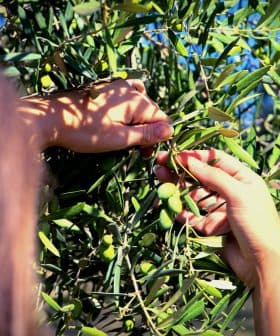Dogs and Drones: New Projects in Puglia Emphasize Early Detection Against Xylella
Using thermal sensing and the powerful noses of dogs, authorities in Puglia ramp up efforts to detect the latest outbreaks of Xylella fastidiosa before symptoms occur.
Italy is developing new prevention and early detection systems to combat the spread of Xylella fastidiosa, a deadly olive tree pathogen that has infected millions of trees in Puglia. Through projects like Redox, drones equipped with thermal sensors are being used to identify infected plants early, while detection dog units are also being deployed to detect the bacterium through their sensitive sense of smell.
The fight against Xylella fastidiosa requires the development of ever more precise and reliable prevention and early diagnosis systems.
From drones to detection dogs, Italy is developing new weapons to contain and eradicate the deadly olive tree pathogen.
The goal of the Redox project is to develop a methodology applicable to large areas to identify olive trees that are infected with Xylella but do not yet show evident symptoms.
To date, the bacteria has infected 21 million olive trees in Puglia and is dangerously advancing in other regions.
Authorities believe the ability to identify infected plants early represents a critical strategic element and an essential condition to effectively counteract its advance and prevent the bacterium’s arrival in previously unafflicted areas.
See Also:An Estimated 33,000 Jobs Lost to Xylella Fastidiosa in PugliaThrough the Redox (Remote Early Detection of Xylella) project, drones are used to identify new Xylella fastidiosa outbreaks at the early stages of development, improving the effectiveness of containment measures and reducing the time and costs associated with detection, monitoring and sampling of plants.
Funded by the Italian Ministry of Economic Development, authorities deploy uncrewed aircraft equipped with thermal sensors to monitor extended areas accurately.
“The goal of the Redox project is to develop a methodology applicable to large areas to identify olive trees that are infected with Xylella but do not yet show evident symptoms,” said Vincenzo Barbieri, the chief marketing officer of Planetek, which provides aerial and drone data processing for the project.
According to researchers, a tree affected by Xyella fastidiosa can be detected even before the characteristic desiccation of its leaves through almost imperceptible physiological alterations, such as color.
The hyperspectral sensors mounted on the drones are expected to reveal these slight changes, allowing for an early diagnosis and potentially stopping the outbreak before it spreads.
“Through these techniques, we try to limit the infection as much as possible, at least until genetic research will provide a new generation of plants resistant to the bacterium, able to replace the traditional ones,” Barbieri said.
The first trials of the project are underway in Monopoli, in the province of Bari. A long-endurance drone provided by the Italian Aerospace Technology District was equipped with sensors and a radiometric thermal camera to acquire remote sensing data. The data may then be compared with sample data obtained from other areas.
Besides the testing in Monopoli, two other air flights are already planned in April and August 2022 within the Italian national action plan against the bacterium.
Also, in Puglia, the first Xylella detection dog task force was officially introduced to detect the bacterium through their extremely sensitive sense of smell.

Jack Russell Terrier
The unit comprises six dogs: two Jack Russells, a Belgian Shepherd, a bloodhound, a Labrador retriever and a springer spaniel. The dogs will be used at nurseries and areas where plants are imported – ports and airports – to identify infected plants before the appearance of recognizable symptoms.
The task force started in June 2021 with dogs that were already expert detectors.
“The training was very intense: it took months to submit to the dogs’ attention hundreds of samples of plant odors to have an idea as precise as possible of the smell of the infected plants,” dog trainer Serena Donnini said.
“Dogs were selected based on their particular aptitude to olfaction research: by now, there are eight Xylella detection dog units ready to take action,” she added.
Share this article









